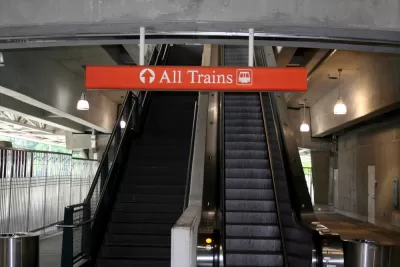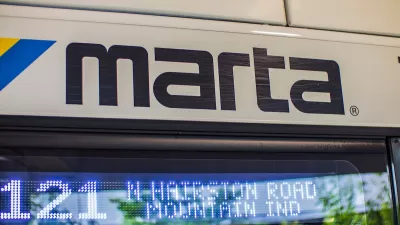To discourage users from peeing on elevators at Atlanta MARTA stations, new urine detection technology is being installed as part of rehab plans.

To cut down on the number of people urinating in elevators at MARTA stations across Atlanta, new pee detection technology is being installed as part of a $149 million rehab program for the system. Dave Wickert of the Atlanta Journal Constitution reports that the anti-pee technology will flash a strobe light, sound an alarm, and alert MARTA police when urine is detected.
When the elevator door opens, the elevator will stop and won’t operate again until MARTA employees reset it. A crew will clean, sanitize and deodorize the elevator before putting it back into service.
[Tom Beebe, MARTA’s director of vertical transportation] said signs will warn people about the urine detectors. The detectors have already been installed on 13 MARTA elevators and eventually will be installed in all of them.
Wickert notes that plans for future upgrades include adding restrooms to more MARTA stations.
FULL STORY: More urine detectors coming to MARTA elevators

Maui's Vacation Rental Debate Turns Ugly
Verbal attacks, misinformation campaigns and fistfights plague a high-stakes debate to convert thousands of vacation rentals into long-term housing.

Planetizen Federal Action Tracker
A weekly monitor of how Trump’s orders and actions are impacting planners and planning in America.

In Urban Planning, AI Prompting Could be the New Design Thinking
Creativity has long been key to great urban design. What if we see AI as our new creative partner?

King County Supportive Housing Program Offers Hope for Unhoused Residents
The county is taking a ‘Housing First’ approach that prioritizes getting people into housing, then offering wraparound supportive services.

Researchers Use AI to Get Clearer Picture of US Housing
Analysts are using artificial intelligence to supercharge their research by allowing them to comb through data faster. Though these AI tools can be error prone, they save time and housing researchers are optimistic about the future.

Making Shared Micromobility More Inclusive
Cities and shared mobility system operators can do more to include people with disabilities in planning and operations, per a new report.
Urban Design for Planners 1: Software Tools
This six-course series explores essential urban design concepts using open source software and equips planners with the tools they need to participate fully in the urban design process.
Planning for Universal Design
Learn the tools for implementing Universal Design in planning regulations.
planning NEXT
Appalachian Highlands Housing Partners
Mpact (founded as Rail~Volution)
City of Camden Redevelopment Agency
City of Astoria
City of Portland
City of Laramie





























